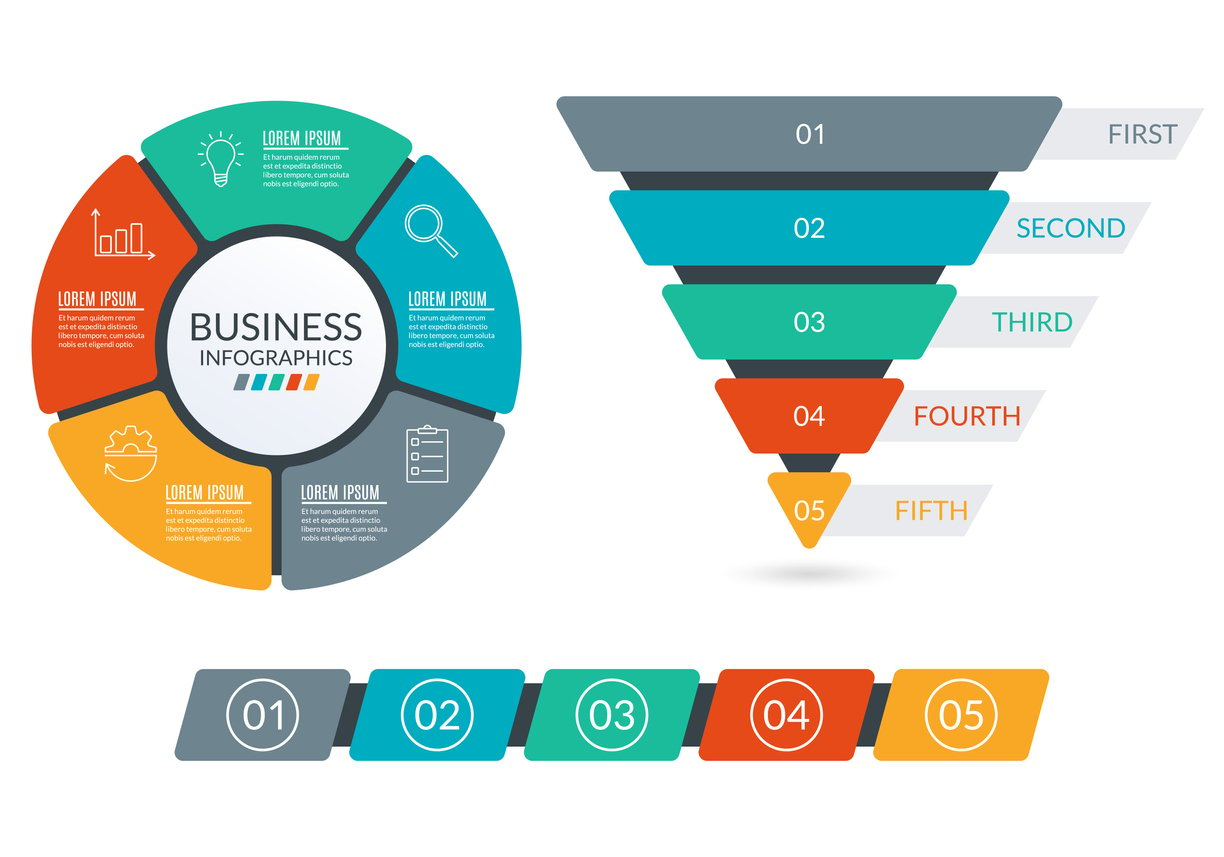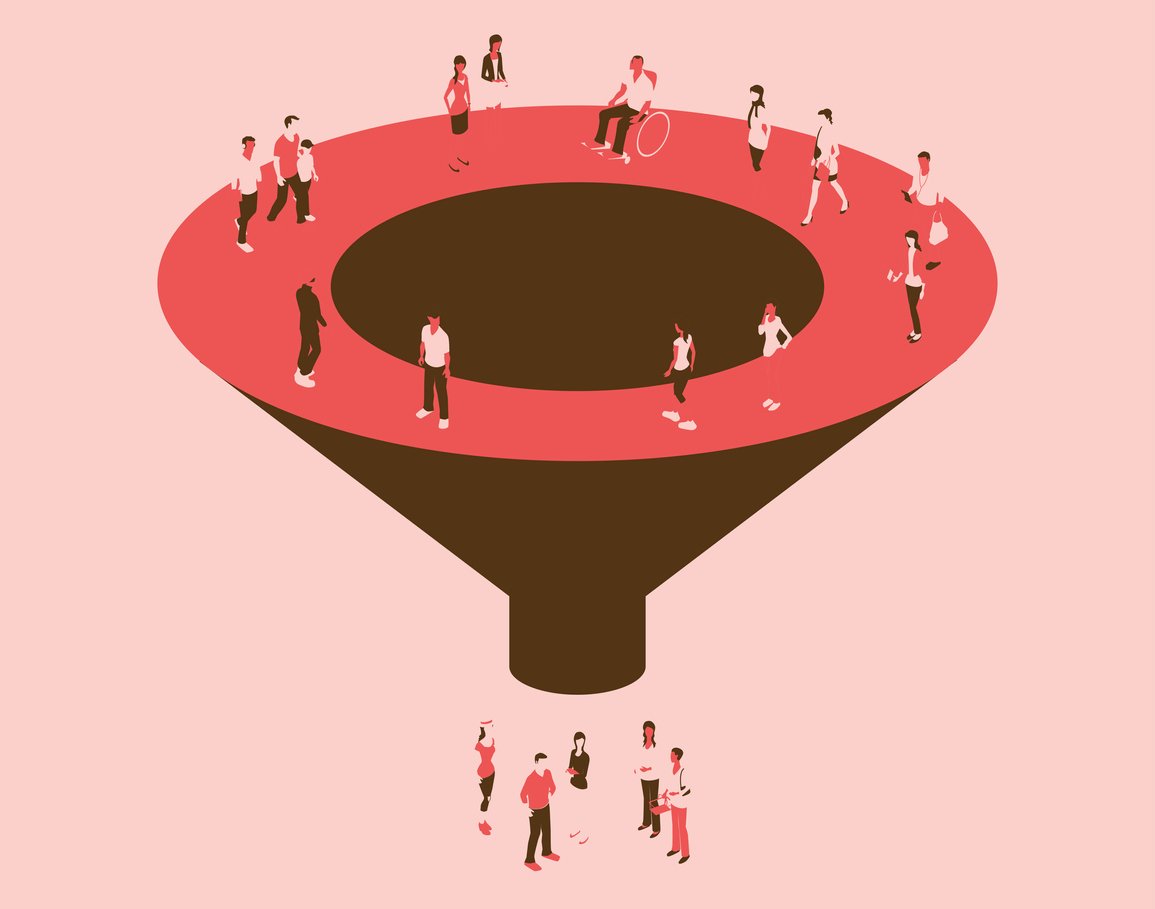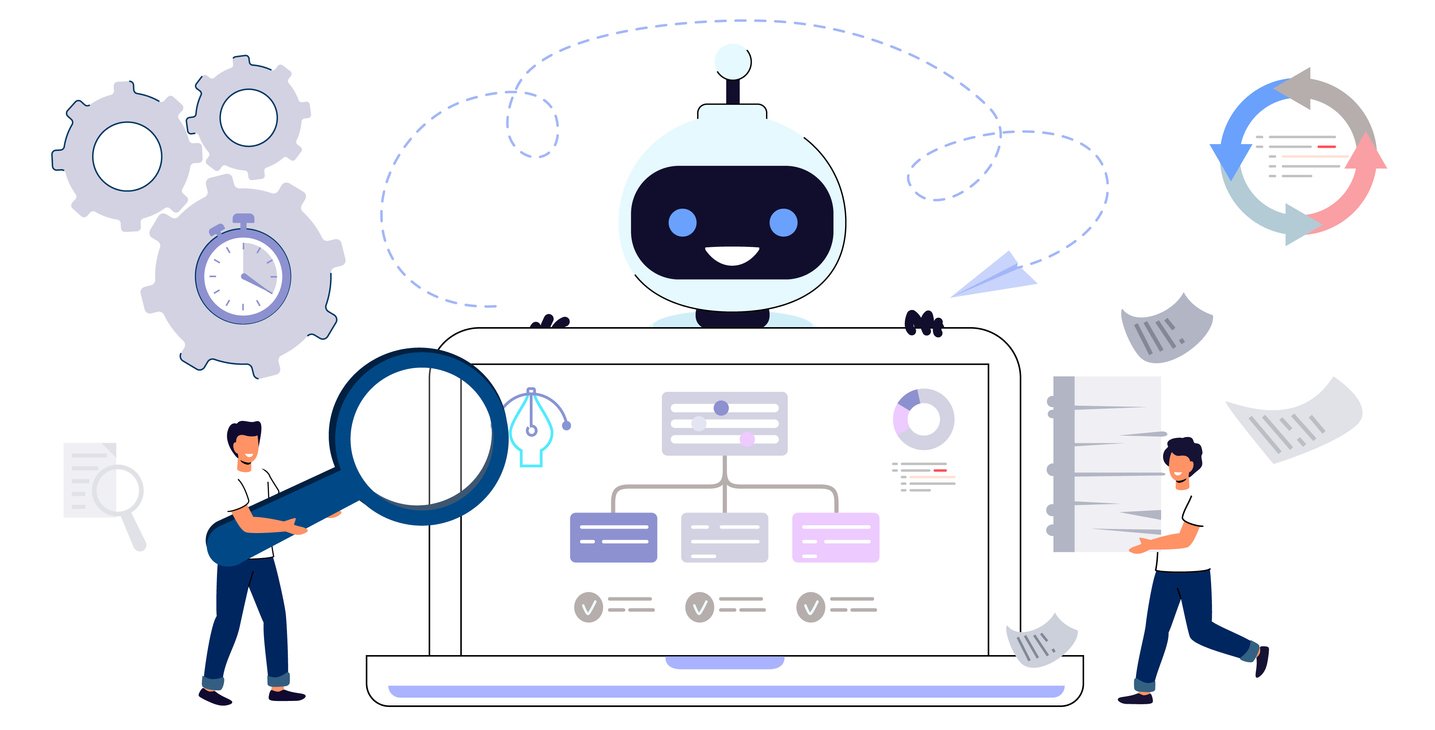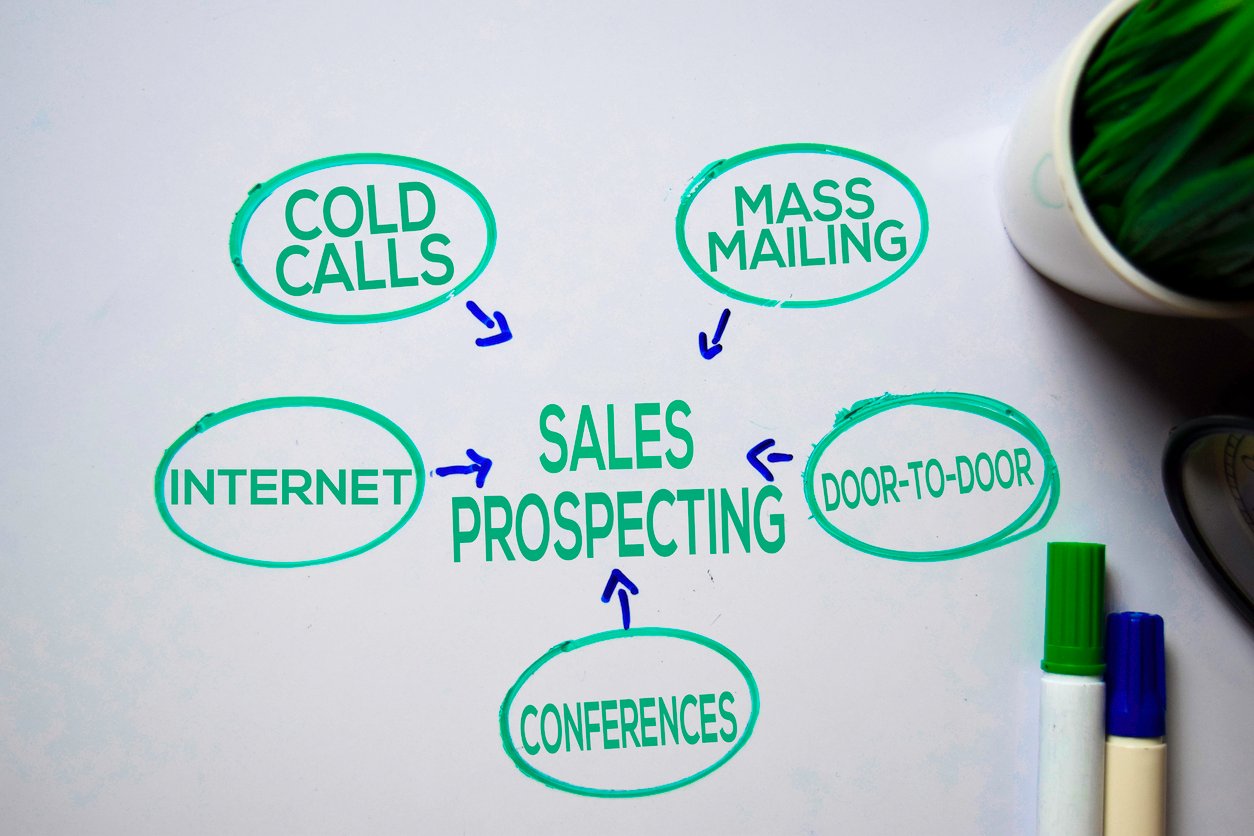
Your CRM Training Questions Answered [Types, Benefits, Cost & More]
 Updated on
Updated on
By Ringy
Table of Contents
Table of Contents
You've got the CRM tools, you've got the CRM technology, and you kinda-sorta-maybe got the CRM training. It's a work in progress, right?
Level with us. How's that going? Low adoption rates, a not-so-hot ROI, and no consistency except that everyone is always confused?
We get it. Like most things, from microwaves to phones to video games, it's too tempting to skip the tutorial.
Also, a CRM is a power-up item specifically made for your sales team. How hard could it be?
Here's the thing. Without training, your CRM will morph into an infinite series of spinning and flaming hoops for your team to jump through.
Of course, it's possible to succeed this way.
But you don't have to.
That's why you're here, right? You know CRM training for your team is the secret side quest to level up your company's game.
Roll up your sleeves, do a power pose, and get ready. We're hitting the books.
What is CRM Training?
Okay, but first, a quick and fun CRM refresher.
Customer Relationship Management is a centralized platform that your team can refer to for in-depth information on your customers.
Yes, that does mean the basics like contact information and shipping addresses, and so forth.
But a CRM also provides insight into the trajectory of a customer's experience and, ultimately, the sale.
Also, with repeat customers, you can see loyalty take root in real-time. Some platforms can even help with sales coaching and training.
This all sounds pretty good, right?
Here's the not-so-fun part.
CRM adoption is still a struggle for companies. Probably because:
- 22% of users don't know what a CRM is
- Or 43% of users admit they're using less than half of its functionality
Think about it. If your employees don't know how to use your CRM system, they can't help your business or customers.
Good thing training can help flip the script on that and more.
Where to start? Keep reading.
5 Types of CRM Training
Zoom out and consider what you want to get out of CRM training…
The basics? An in-depth look that puts microscopes to shame? Maybe a tutorial that can talk about utilizing a CRM beyond data entry?
All of those options are out there waiting for you, we promise. But maybe you're also wondering, what the heck is the best way to learn CRM?
We've outlined five CRM training types below.
1. Vendor/Platform CRM Training
When it comes to learning the nuts and bolts of a platform, your vendor is a solid option.
Some vendors, such as Salesforce and Microsoft, have massive training libraries, including courses and certifications.
However, these certifications can be costly and take several months, if not longer, to complete.
More prominent companies often offer customized onboarding packages, but they usually cost a penny.
The good news is since it's more or less an expectation nowadays, most small platforms offer CRM onboarding as well.
The better news? Ringy takes training a step further.
We provide personalized onboarding for your company. We also hold multiple weekly webinars for your team to either learn more about our CRM or ask questions.
Within our platform, we've also attached training videos to individual sections.
And if you have questions, we will try to get back to you within 2 hours with a live-training video call.
Hey, we don't mess around when providing the best CRM software training for our platform.
2. In-Person, In-House CRM Training

This CRM training type is attractive for three main reasons.
First, it's probably the most affordable. You don't have to budget for an outside consultant or online course since your team will develop the learning materials.
Second, you also can tailor the training to what your company needs. This means you'll probably be quicker and better at meeting employees where they're at.
Third, you know what they say - the best way to learn something is to teach it. This means you'll have team savvy on two fronts of using your CRM system.
Whether you have a manager or someone with enough hands-on knowledge to run the training, your best bet is first to determine what roles will need it and go from there.
Remember, you'll need to create and regularly update your documentation. This could be anything from creating videos, presentations, or documentation. Or all three.
This is not to put you off, but it is something to keep in mind.
If you want to brainstorm how you can better support your sales team in crushing their CRM goals and how Ringy can help you coach in real-time with upline support, read our blog post on 10 Sales Coaching Tips.
3. External CRM Consultants and/or Trainers
Did you know that over 91% of companies with ten or more employees have a CRM?
This also means a savvy subset of consultants and trainers just waiting to offer their specialized knowledge to help your company make better use of your CRM.
Since they are a hot commodity in high demand, they usually run you around $180 an hour or more.
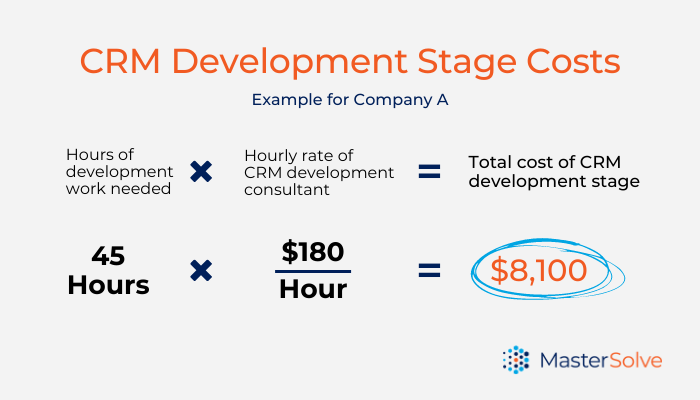
Now, no one knows better than a consultant what to focus on and what to watch for. It's kind of their whole gig.
You could also use a consultant as a launching point and e-learning for ongoing CRM training.
4. Self-Paced Online Courses for CRM Training
E-learning is one of the best touchstones for upskilling, but you can also use it for employee onboarding and even as part of your in-house training.
From LinkedIn to edX to HubSpot Academy, you can find whole online courses dedicated to learning a CRM inside and out. Or you can choose a course based on an employee's level of knowledge or what applies specifically to their role.
Online courses also allow your employees the flexibility to learn on the job and on their time.
5. Online CRM Certification
CRM certifications are pricey but powerful. These in-depth programs are usually vendor-specific and skills-based.
Spanning months or even a year, online CRM training with a certification stands apart for a few reasons.
One, it motivates employees. Once they finish, they know they can add a shiny credential to their resume or LinkedIn.
It ends with an exam, so employees who pass know their stuff.
Finally, it gives them a focused set of skills so they can use your company's CRM in a way that best meets your bottom line and helps your customers.
5 Benefits of CRM Training

When it comes down to it, supporting your employees so they can support your customers is the crux of CRM training.
Think about it, though. This also means that you'll have a knowledgeable and motivated team ready to tackle any challenge.
Let's look at the five ways that often play out.
1. Tackle Employee Upskilling + CRM Adoption
Technology moves fast, and the last thing you want is for your employees to get left behind.
Also, with the pandemic disruptions and the remote workforce shake-up, some 58% of workers will need new skills (ahem, training) to do their job successfully.
Think about it. You want to give them a way forward with their career at your company – not a roadblock.
A one-off CRM training is good, but upskilling helps your employees stay on their game since platforms are constantly evolving.
Also, it almost goes without saying, but we'll say it.
The better-trained someone is on a CRM platform, the more they'll know it, and the more they'll use it.
Suddenly you're not worried about poor CRM hygiene anymore. Pretty sweet, huh?
2. Improve Customer Insights + Experience
CRMs are packed with customer data.
But how do you and your employees use all that information?
After all, you don't want it to sit and collect digital mothballs. You want to use it to relate better to customers and give them an experience that leads you to that sweet victory lap called brand loyalty.
Circling back to the lots and lots and lots of data part – you can help your company get there if you train employees on the best way to interact, understand, and apply CRM data.
After all, 84% of your customers expect it, and 74% of them agreed they were much more satisfied with a company properly using a CRM.
3. Boost Conversion Rates + Customer Engagement
CRM stats do not pull punches.
Ready? A CRM can boost conversion rates, not by 100% or 200%, but 300%. What?!
Part of this has to do with customer expectations. Over half of your customer base expect companies to personalize their experience, and 76% want consistent communication.
That consistency is hard if every department uses your CRM system differently.
But with training, your team can coordinate across different departments while monitoring key performance indicators and marketing campaigns to ensure they're reaching out to customers at the right time.
Also, you'll be able to compare and contrast those same metrics and better serve repeat customers, too. Your team can reach out to offer discounts or similar services by knowing how to analyze their past behavior captured in your CRM.
Okay, but what about customer engagement? Glad you asked.
If a company uses a CRM, it is more likely that the customer will return, but they'll also probably end up spending 20% to 40% more on their next purchase.
4. Increase Revenue + Productivity
Make more money and be more efficient about it? Heck yeah.
If a company adopts a CRM in a capital P proper way, including, you guessed it – training – revenue can increase by 41%. Not overall – but per sales representative.
How? A CRM doesn't just help your customers. It also gives your sales reps – and their managers – information on their performance. Quotas can be pulled up as quickly as a sales funnel can be tracked.
Not only that, but are those sales reps making more money? They're also reporting increased productivity. And 50% of their bosses are noticing.
Think about it: a CRM system streamlines the administrative side of things, i.e., qualifying leads, which means your team has more time to assist and sell to customers. You can also set automation options so that customers can use a CRM's self-service options to solve problems.
5. Harness better ROI + Forecast Accuracy
So, let's pretend you're still not convinced.
We saved the best for last.
Forecasting market trends and customer behavior can be tricky. CRMs can improve overall forecast accuracy by over 40%.
This means your sales team can make better connections in real-time with your customers and in the future, too. This way, you can make better decisions about hiring and budgets when reporting to your CEO.
Better yet, by training your employees and firing up the CRM on all cylinders, you can get a 771% ROI. So, for every dollar spent on a CRM, experts calculate you can make $8.71. Nice.
Let's talk about how you can get there by looking at the costs of CRM training.
Costs of CRM Training
The cost of CRM training has more range than a free chicken.
Speaking of free, there are free CRM training courses and webinars, and then there are the not-so-free, several-thousand-dollars worth of hidden costs free training courses.
Let's look at CRM training online versus in-person.
Online
Often, the cost of CRM online training comes down to the certification or certificate question.
We talked about credentials before. They're an absolute heavyweight in terms of training and skills assessment. They're also long and end with a test.
While exceptions, most vendor CRM certifications cost around $200, such as Salesforce and Microsoft Dynamics 365. They are intended to ensure that someone walks away as a proficient user of their platform.
Meanwhile, a certificate is a nice, shiny digital page you get at the end of a course.
Now, paying less doesn't necessarily mean you're missing out.
Certificates and cheaper online courses are shorter, allowing you to widen your expertise on your time and usually at a quicker pace.
But you might need that narrow focus for your employees, and there is the motivation factor. A certificate is getting knocked out by a certification, hands down.
Also, CRM certification(s) covered by an employer look mighty good to your future applicants who are serious about upping their sales game.
In-Person
In-Person training might be cheaper if run by a manager or team member. You create the materials and figure out the best time to run the course.
However, before you run into creating your courses, you have a couple of internal costs to consider and weigh up:
- The labor costs of the people creating and delivering the training
- The opportunity cost of having your employees focus on training rather than their core responsibilities
And when comparing, remember that external trainers and consultants, as mentioned early, start at about $180/hr.
Pros and Cons of Free CRM Training

Free CRM software training have also reached the scene as CRM usage has become more widespread.
It can be a viable option, but some serious drawbacks to consider.
|
Platform |
Pros |
Cons |
|
edX for Business |
Self-paced online course by industry leaders and universities Dedicated to upskilling the workforce |
Material covered may be too broad to be relevant More big ideas than nuts and bolts and day-to-day usage |
|
Hubspot Academy |
Course material can be helpful and informative no matter your CRM Offers a LinkedIn badge upon completion |
Mainly focused on inbound marketing Platform-specific to HubSpot |
|
YouTube |
Wide range of material, from broad to more focused Excellent way to supplement in-house training materials |
Information may be inconsistent or incorrect A savvy manager or trainer will need to vet the videos |
|
Salesforce Trailhead |
A gamified platform dedicated to upskilling a global workforce Connects a user with a community of like-minded learners |
Very platform-specific Certification costs are pricey, and you have to take a test |
Keep reading to weigh the pros and cons of free online CRM training.
Pros of Free CRM Training
Some free online courses are broad enough to apply to most CRMs.
If you go in knowing what you want to get out of it, these can be an invaluable resource.
Self-paced courses are on edX for Business and Hubspot Academy.
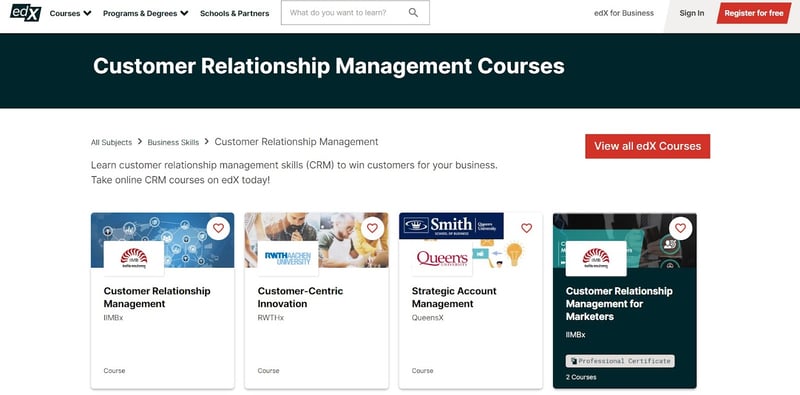
These courses try to apply to sales teams across the board. Either industry professionals or universities put them together.
- These courses are flexible, quicker to complete, and can be an excellent source of online CRM materials if you put them together with in-house training.
- By focusing on the big idea, the training usually offers valuable marketing and sales-focused insights that might get overlooked in a more product-specific course.
- This can be excellent for brainstorming and creative thinking and getting users excited to use your CRM system and motivated about challenges they face with their sales.
- These courses are also an excellent way to learn the basics.
- Depending on the platform you use, your vendor may already have free material for you to train with, such as Salesforce Trailhead.
- Again, they're free! Also, after finishing a HubSpot academy course, users get a LinkedIn badge.
Cons of Free CRM Training
Depending on your CRM platform, there may be a lack of free materials that are applicable and useful.
Also, the broad focus of online courses offered by edX and Hubspot Academy may be too broad to help your team with day-to-day CRM use.
- The training is not specific: if the CRM training is too broad or offered by a different platform than your CRM, your employees won't learn applicable skills, and you won't see a return on your investment.
- If the certification or certificate cost is not covered by their employer or presents a barrier to finishing, your employees may feel they have nothing to show for it.
- This could result in less motivation to go through the training or attend to it with diligence.
- The certificate for the edX course and unlimited access costs $149. So, not entirely free.
- Salesforce Trailhead is a fantastic resource – for Salesforce users.
- The certifications tend to be hyper-specific, time-consuming, and require experience.
- They also range in cost from $200 to $6000, and you have to pass a test.
- YouTube can be a bit of a wild west environment. Someone will need to vet the user who uploaded the videos and the video itself.
- Another con is the risk that the free materials could vanish or go up behind a paywall at any time.
Where To Find The Best CRM Training Programs
Most CRM vendors offer their training and certification directly through their platform.
Just know that while the CRM training materials might be free, the certifications can be costly.
However, with the rise of online learning spaces, you can also find CRM courses on:
- LinkedIn Learning
- Coursera
- PluralSight
- And more…
These range from broad examinations of the material to more platform-specific. They're usually a little faster and more affordable, too.
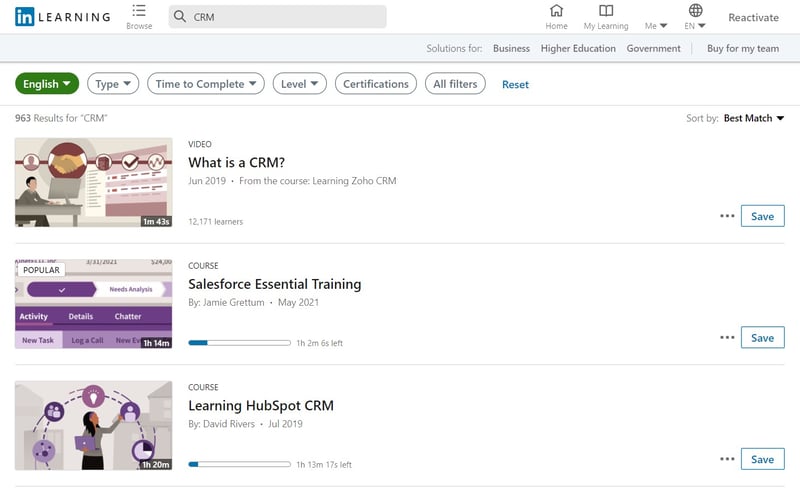
That being said, let's look at CRM training options for the five following systems.
- Salesforce
-
- As the most prominent and most recognizable name in the CRM market, they offer 30 certifications and 100 training resources, usually by role.
- Dynamics 365 by Microsoft
- With almost 70% of the globe using a Windows operating system, it is a viable contender in the CRM market. It also offers role-specific certifications.
- HubSpot Academy
- A reputable, recognizable inbound marketing agency and CRM platform. Note, to complete some certifications; you may need Pro or Enterprise level software.*
- Marketo Engage by Adobe
- Adobe is another reputable and recognizable name with its own CRM. Though training is available, hands-on experience is recommended to pass the certification exam.
- Zendesk
-
- A popular platform for customer service solutions.
|
Examples of Courses/Certifications |
Platform/Vendor |
Length |
Cost |
|
Role specific, i.e. Salesforce Administrator or Marketer |
Varies from 30 to 200+ hours |
Varies from $200 to $600 |
|
|
Role specific, i.e. Dynamics 365 Marketing Functional Consultant Associate Also offers Dynamics 365 Fundamentals |
Dynamics 365 – Microsoft Learn |
Varies |
Free training $99 to $165 for exam and cert |
|
HubSpot Marketing Software CMS for Marketers |
1 to 6 ½ hours |
Free |
|
|
Marketo Core Concepts I Adobe Certified Professional–Marketo Engage Business Practitioner |
Marketo Engage – Adobe Digital |
Varies, not including 200-400hrs hands-on exp |
Varies from free to a $5000/yr subscription |
Role specific, i.e. Zendesk Support Administrator Zendesk Explore CX Analyst |
Zendesk – |
Varies from 1 to 10+ hrs, not including 3+ months hands on exp |
Free online courses, but webinars can cost $849 |
|
(Platform specific) >Salesforce Administrator Cert Prep: The Basics >Microsoft Dynamics CRM Essential Training >Learning HubSpot CRM |
Typically 1hr |
$26.99/yr to $39.99/mo for individuals Teams can contact LinkedIn for pricing |
|
|
(Platform Specific) >Microsoft Dynamics CRM Essential Training >HubSpot Sales Representative Professional Certificate |
Up to 6 months |
$39 to $99/mo |
|
|
(Platform Specific) >Salesforce Certified Administrator |
Varies from 2hrs+ to 20hrs+ |
$45/mo for individuals Contact for teams pricing |
CRM Training FAQs
“Who should get CRM training?”
Just ask yourself, “who will be using our CRM system?”
And the answer will be pretty much everyone in your sales, marketing, and customer service teams will benefit from CRM training resources.
Plus the IT people, of course, as they might be called to help when there's an issue.
“Is it hard to learn CRM?
While hands-on experience can give you a leg up, there is no substitute for proper training. It takes time and patience to get the hang of a CRM system, but it is meant to be an intuitive platform, so you'll get there with a little patience and help.
The hardest part will be getting the most out of it for your specific needs.
“How often should CRM upskilling take place?”
You should upskill your staff whenever there are critical updates to the CRM system. In this way, you rest assured that your employees won't get frustrated and either seek workarounds or stop using certain key functionality.
But it's also not a bad idea to implement ongoing training to help boost employee morale and motivation.
Get Started With a User-Friendly CRM Today!

When it comes to CRM training, you now know that there are plenty of options to choose from. Not to mention a lot of price points to consider.
Don't forget how training can help you level up your team's CRM game.
And hey, if you are looking for a CRM that understands the importance of exercise and upskilling, check out Ringy.
We're an intuitive, easy-to-learn CRM that offers in-platform, informative videos, two webinars a week and live training support within two hours.
Request a demo today and let us wow you.

Skyrocket your sales with the CRM that does it all.
Calling? Check. SMS? Check. Automation and AI? Check. Effortlessly keep in touch with your customers and boost your revenue without limits.

Take your sales to new heights with Ringy.
Sales in a slump? Ringy gives you the tools and flexibility you need to capture leads, engage with them, and turn them into customers.
Subscribe to Our Blog
Enter your email to get the latest updates sent straight to your inbox!
Categories
Related Articles























